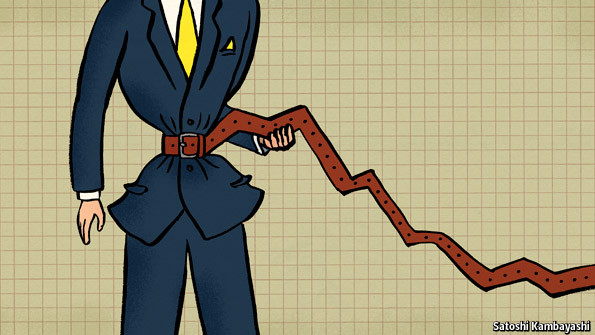Let’s get fiscal
A new book from a prescient economist
Dec 20th 2014
WHAT is the Japanese word for Schadenfreude? For much of the late 1990s and early 2000s, Western economists and politicians were happy to lecture the Japanese government about the mistakes it made in the aftermath of its asset bubble. But six years after the collapse of Lehman Brothers, the investment bank whose demise triggered the financial crisis, many Western economies are still struggling to generate decent growth. Their central banks are being forced to keep interest rates close to zero. Yields on government bonds in Europe, as in Japan, have sunk to record lows. Some economists are talking of a new era of “secular stagnation”.
A new book* from Richard Koo of the Nomura Research Institute argues that the West has made glaring errors too. “We are experiencing not only an economic crisis but also a crisis in economics,” he writes. “Most economists failed to predict the current crisis and the economics profession itself has fallen into a state of complete disarray in its attempt to answer the question of what should be done.”
Mr Koo argues that the 2008 downturn was what he dubs a “balance-sheet recession”. This occurs when the private sector has borrowed heavily to invest in assets (particularly property); when asset prices decline, the nominal value of the debt remains. Cutting interest rates helps a bit (by reducing the cost of servicing the debt) but it does not persuade people to borrow more money, because they are still trying to repair their balance-sheets. “Private sectors in most countries in the West today are minimising debt or maximising savings in spite of zero interest rates, behaviour that is at total odds with traditional theory,” he writes.
This makes monetary policy much less effective. The policy of quantitative easing (QE), the creation of money to buy assets, succeeded in expanding the balance-sheets of central banks but did not push up bank lending or boost the amount of money circulating among companies and consumers. That explains why QE has not resulted in the hyperinflation that some feared and also, in Mr Koo’s view, why QE has not been very effective.
Instead, governments should have focused on fiscal policy. There was a burst of stimulus in 2009 but, alarmed by the size of their deficits, governments started to cut back too quickly.
They should have paid attention to the examples of Japan in 1997 (or America in 1937) when premature fiscal tightening derailed recoveries.
Whereas most outsiders think Japanese fiscal policy was a failure, Mr Koo argues it was an enormous success. Japan’s GDP never fell below its pre-bubble peak despite an 87% fall in commercial-property prices and a corporate rush to repay debt. Without its fiscal deficits, Japan could have suffered a Great Depression; instead its unemployment rate never rose above 5.5%.
Since 2008, Western politicians have worried too much about the perception that public spending can be wasteful and that big deficits would lead to soaring bond yields. Governments could hardly misallocate resources that would otherwise be unemployed. The real recovery from the Great Depression came with the fiscal stimulus engendered by the second world war, when no one complained that governments were wasting money on armaments and air-raid shelters. And yields would have stayed very low even without QE because the private sector was saving so much.
In Europe, there has been a lot of focus on structural reform: changes to the supply side of the economy that can boost its growth rate. But Mr Koo argues that focusing on structural reform in a balance-sheet recession is like treating a patient for diabetes when he also has pneumonia: the reforms take too long to work.
Mr Koo’s case, which he first made in “The Holy Grail of Macroeconomics”, a book published in 2008, has been strengthened by intervening events. However, there are some points that he glosses over. A side-effect of QE is that asset prices have risen sharply in value; that should have repaired corporate and personal balance-sheets but the private sector is still not borrowing. Why not? And he probably does not take the arguments for secular stagnation seriously enough: deteriorating demographics and sluggish productivity growth are important.
Growth in the rich world has been slowing for decades. Even politicians with the wisdom of Solomon might have struggled in the circumstances.
* “The Escape From Balance Sheet Recession and the QE Trap: A Hazardous Road for the World Economy”, published by John Wiley

0 comments:
Publicar un comentario